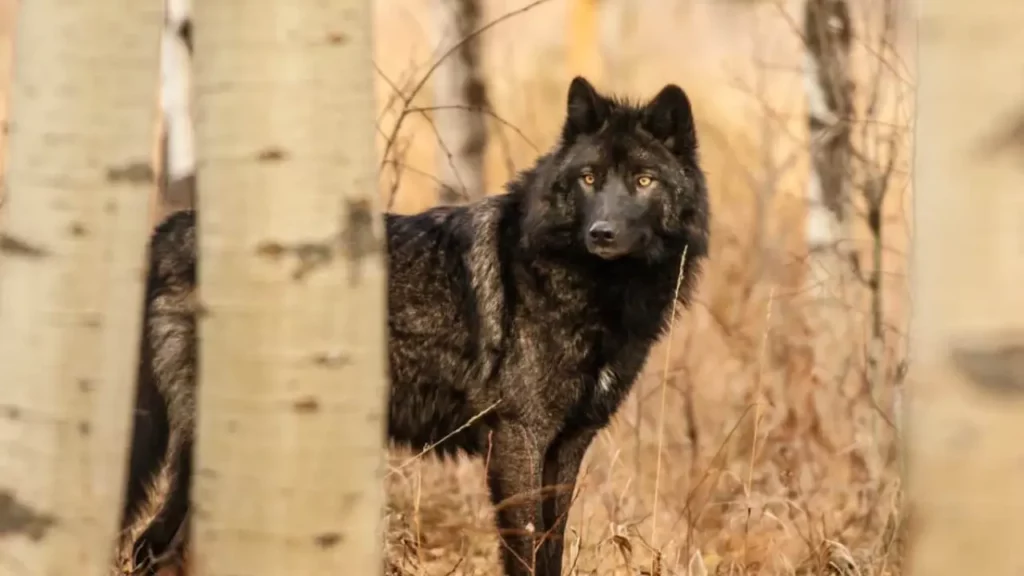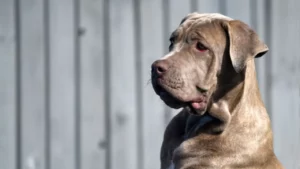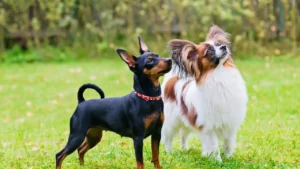Black Wolf Dog: A Hybrid of Beauty and Controversy

What is a black wolf dog?
When a wolf is crossed with a domestic dog like a German Shepherd Dog, Siberian Husky, or Alaskan Malamute, the result is a dog with a black coat. This intelligent and energetic dog, despite its stunning appearance, has particular pet care needs that can make ownership very difficult. In this article, we will explore the origins, characteristics, controversies, and the allure of Black Wolf Dogs.
A black wolf-dog may resemble either its canine parent or its wolf parent, depending on which dominant traits it inherited. So, if a black wolf-dog inherits more wolf genes from its wolf parent, it is referred to as being “high-content.” Its characteristics are therefore more wolf-like than dog-like. A black wolfdog with “low content,” however, resembles a domestic dog more. Due to their greater desire to please and lower level of aggression, these dogs are typically easier to handle in terms of behavior and training. A “mid-content” black wolfdog, on the other hand, inherits roughly equal characteristics from its wolf and dog parents.
The topic of keeping a black wolf-dog as a pet is hotly contested. In some parts of the United States, it is even prohibited to own one. Because of this, if you intend to own one, careful planning and research must be made.
What does a black wolf-dog look like?
Regarding a black wolf-dogs appearance, there are no set guidelines. Depending on the characteristics they inherited from their dog and wolf parents, these medium- to large-sized dogs can have a variety of appearances.
They typically resemble wolves in appearance, with thick, double coats of black fur and protruding long muzzles. Their eyes, which can be brown, green, or blue, are also present. Their heads are typically smaller than wolves, and their pointy ears are typically bigger.
Black wolf dogs that have a higher percentage of wolf genetics also tend to have longer teeth than typical dogs, which allows for deeper bites. Additionally, if they are like their dog parent, black wolf dogs might inherit dewclaws. But if they are like their wolf parent, they won’t have this feature.
All in all, the appearance of a black wolf-dog exudes a mystical, charming, and wild canine.
What causes the black coat color of a black wolf dog?
The solid black coat of the black wolf-dog is due to its inherited dominant black gene called eumelanin. This dominant black gene produces black pigment over the entire body of the wolf-dog and expresses itself in the K locus of the dog’s genes.
It’s interesting to note that wolf-dog hybridization transferred the dominant black gene from domestic dogs to wolves. The University of California at Los Angeles and Stanford University School of Medicine’s genetic studies have shown that a mutation that happened in domestic dogs is what gives black-coated wolves their distinctive coloring.
What are some challenges of owning a black wolf dog?
Black wolf dogs are not for everyone. They require special care and attention that may not suit most people’s lifestyles. Here are some of the challenges that you may face if you decide to own a black wolf-dog:
- They have a lot of shedding, and their coats will blow twice a year. You will require a good brush and vacuum cleaner in this situation.
- When left alone, they become destructive and experience severe separation anxiety. They might destroy household goods, make holes, or climb over fences.
- Due to their high energy levels, they must engage in rigorous training every day, otherwise, they will become bored and destructive. They need plenty of mental and physical stimulation.
- To prevent anxious or combative behavior as they mature, they must be socialized from an early age. They may not get along well with other pets or strangers.
- Due to their intense prey drives, they may chase after and even eat small animals like cats, rabbits, or chickens.
- Owning a wolf-dog hybrid is illegal in some areas, so there are legal ramifications. You may need to obtain permits or licenses to keep one.
- Inherited health issues from their parents or inbreeding may cause them health issues. Some of these include hip dysplasia, eye problems, heart defects, epilepsy, and allergies.
Conclusion
Beautiful and intriguing creatures that have traits in common with both wolves and dogs are black wolf dogs. They are not suitable pets for everyone because they present numerous difficulties that call for dedication and responsibility. If you’re interested in owning one, do your homework and locate a reputable breeder who can give you genetic tests and health certificates. Before you make a choice, make sure you are aware of the wolf-dog hybrid ownership laws in your area.




